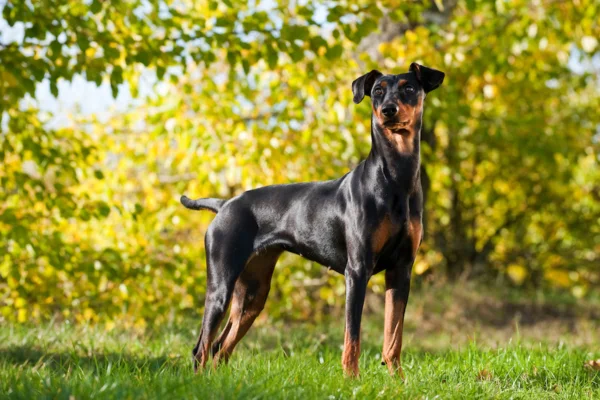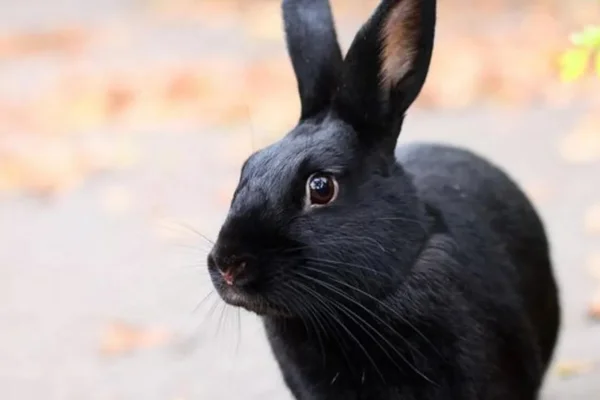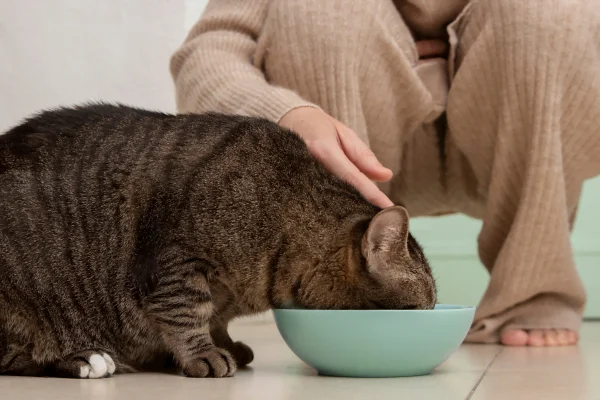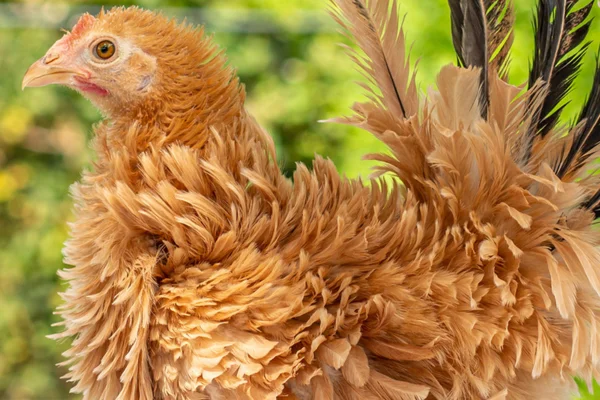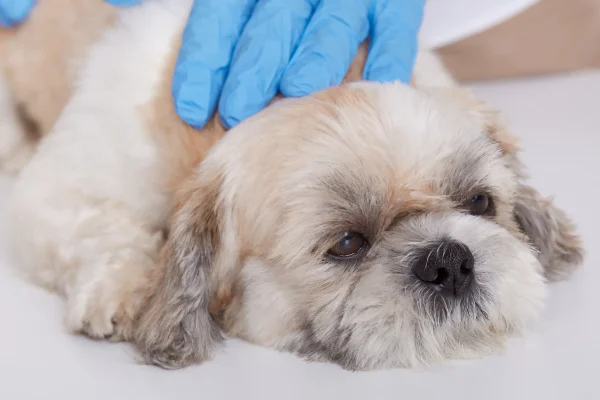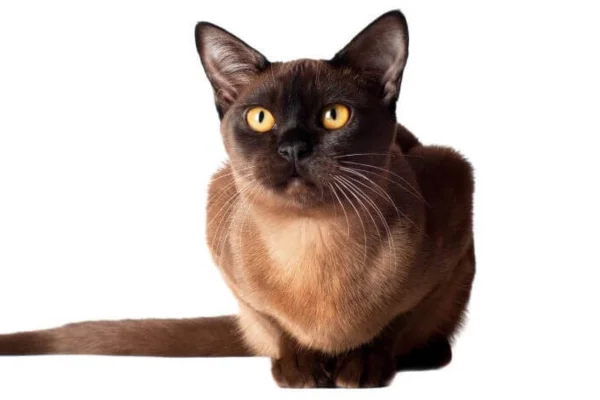German Pinscher: A Little Giant Full of Personality
The German Pinscher is a breed that charms with its energy, intelligence and loyalty. Despite its compact size, this little dog exudes courage and self-confidence, characteristics that make it an excellent choice for those looking for a loyal and protective companion. In this article, we'll explore everything about the German Pinscher, from its origins to essential care, behavior and health, offering a complete overview of this little four-legged giant.
Origin and History of the German Pinscher
The German Pinscher has its roots in Germany, where it was developed as a multifunctional working dog. The breed is believed to be one of the oldest in the country, with records dating back to the 19th century. Originally, the German Pinscher was used on farms to hunt small rodents and protect territory. Its ability to catch mice quickly made it indispensable to the farmers of the time.
The breed is considered to be the ancestor of other well-known breeds, such as the Miniature Pinscher and the Dobermann. Although the German Pinscher went through a period of decline at the beginning of the 20th century, it was revitalized thanks to the efforts of dedicated breeders who recognized its value as a companion dog and maintained the breed's original characteristics.
Contents
Physical characteristics
The German Pinscher is a medium-sized dog, with a height of between 45 and 50 cm and a weight of between 14 and 20 kg. Its body structure is elegant, with well-defined muscles and an athletic build that suggests agility and endurance. The German Pinscher's coat is short, dense and shiny, usually in colors such as black with rusty markings or reddish brown.
Its compact, muscular body is complemented by a well-contoured head with erect ears and dark eyes that express alertness and intelligence. The tail, often clipped in countries where this practice is allowed, contributes to the breed's distinctive look.
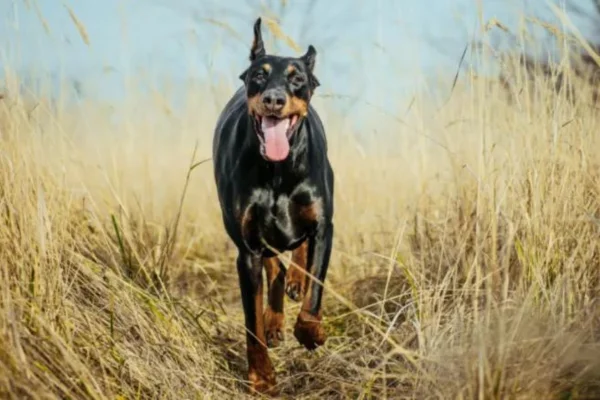
Personality and temperament
The German Pinscher is a fearless, energetic and extremely loyal dog. He is known for his keen intelligence, which makes him a quick learner and eager to please. However, this intelligence goes hand in hand with an independent personality, which can make them somewhat stubborn in some situations.
Despite its size, the German Pinscher is an excellent watchdog. Its protective nature means that it is always on the alert, ready to defend its family from any threat. However, this same characteristic can make them reserved with strangers, requiring proper socialization from puppyhood to avoid excessively defensive behaviour.
Indoors, the German Pinscher is an affectionate and playful companion. They love being close to their owners and can become very clingy, constantly seeking attention and affection. This need for human companionship means that the breed doesn't adapt well to long periods of solitude and can develop destructive behaviors if it doesn't receive enough stimulation.
Caring for the German Pinscher
Owning a German Pinscher is a commitment that requires dedication, especially when it comes to its physical and emotional care. Being a high-energy breed, they need daily exercise to maintain their health and avoid boredom. Long walks, playtime and games that stimulate the mind are essential for a happy and balanced Pinscher.
The German Pinscher's short coat is easy to maintain, requiring only weekly brushing to remove loose hairs and keep it shiny. Baths should be given as necessary, but it's important not to overdo it so as not to dry out the animal's skin. Nails should be trimmed regularly, and dental hygiene should be maintained with frequent brushing to avoid mouth problems.
When it comes to food, the German Pinscher benefits from a high-quality diet, rich in protein and with portions appropriate to its size and level of activity. As with any breed, it's important to monitor the amount of food to avoid overweight, which can lead to long-term health problems.
Health and Life Expectancy
The German Pinscher is generally a healthy breed, with a life expectancy of between 12 and 14 years. However, like all breeds, they can be prone to some hereditary health conditions. Among the most common problems are hip dysplasia, progressive retinal atrophy (a condition that can lead to blindness) and heart disease, such as dilated cardiomyopathy.
To ensure the health of your German Pinscher, it is essential to have regular veterinary check-ups, keep vaccinations up to date and pay attention to any signs of discomfort or changes in behavior. In addition, selecting responsible breeders, who carry out genetic tests and keep a close eye on the health of breeding dogs, is crucial to reducing the risk of hereditary diseases.
Training and Socialization
Due to its intelligence and energy, the German Pinscher responds well to training that uses positive methods, such as rewards and verbal reinforcement. Starting training at an early age is essential for shaping appropriate behavior and ensuring that the dog understands the rules of the house.
Socialization is also a crucial part of developing a well-balanced German Pinscher. Exposing the puppy to different people, environments and other animals helps prevent aggressive or excessively shy behavior in adulthood. As they are naturally protective dogs, proper socialization helps them learn to distinguish real threatening situations from everyday events.
Activities and stimuli
The German Pinscher is an active dog who loves to take part in activities that challenge his mind and body. They excel at dog sports such as agility, obedience and tracking, where they can channel their energy and intelligence in a productive way. In addition, games involving hunting and chasing are ideal for stimulating his natural instincts.
As a dog that enjoys challenges, it's important to offer interactive toys that require problem-solving, such as those that release treats when handled correctly. This not only keeps the Pinscher entertained, but also helps prevent boredom and unwanted behavior.
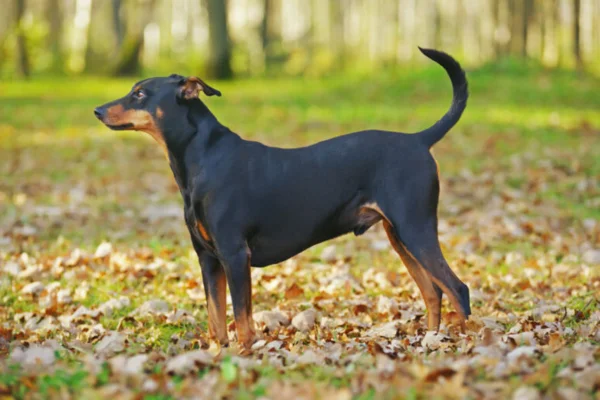
Living with Other Animals and Children
The German Pinscher can get on well with other animals, especially if raised with them from puppyhood. However, its dominant and protective nature can cause conflicts, especially with other dogs with strong personalities. It is therefore important to supervise initial interactions and introduce new animals in a controlled manner.
When it comes to children, the German Pinscher can be an excellent companion, as long as interactions are respectful and supervised. Being a small and agile dog, they can feel threatened by sudden movements or intense play, especially by very young children. Teaching children to interact gently and calmly is crucial to ensuring harmonious coexistence.
Final Thoughts: Is the German Pinscher the Right Dog for You?
The German Pinscher is a dog full of personality, ideal for active people looking for a loyal and protective companion. Its intelligence, courage and energy make it a popular choice for those who want a miniature guard dog with the heart of a giant. However, it's important to remember that this breed requires attention, training and daily exercise to keep it happy and healthy.
Before deciding to bring a German Pinscher into your life, consider whether you have the time and inclination to meet its needs. If the answer is yes, you'll be bringing home not just a dog, but a true friend for all times, who will always be by your side, ready to share every moment with you.
The German Pinscher may be small in size, but he is immense in love and loyalty. With the right care, he will be a faithful companion for many years to come, enriching your life with his vibrant and loving presence.
Thank you for visiting us and check out our other work

